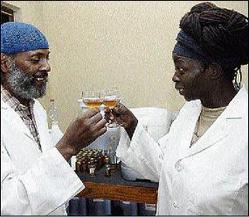Sacha Walters, Staff Reporter

Headley and Sylvia Milliner get ready to have a taste of their hard work. They are producers of local fruit wines called Govangé Supreme Wine Blends. - Photos by Ian Allen/Staff Photographer
Jesus turned water into wine, and on a similar premise, two local producers veered from this norm to use a variety of fruits, instead of grapes, to make their wine.
But their comparison to Jesus is limited. The task might have been difficult, but by no means was it a miracle. "Practically you can turn anything into wine," according to Headley Milliner, who stands testament to these words as he and his wife Sylvia produce Govangé wine from fruits like otaheite apples, almond and June plum to name a few.
He explained that people have been producing fruit wines for centuries and Jamaica is no exception. However, Jamaicans have never brought production to this level, nor have they experimented with the variety of flavours which he and his wife have.
A unique variety is certainly what they have presented with unusual wines like guinep, varieties of cherry along with combinations like mango, guava and orange. They are currently working on an ackee wine, which is still being refined.
Sell something else
The idea all came about when Sylvia, Headley's wife of 27 years, was experimenting with juices. The two got the idea to leave a bottle in the refrigerator longer than usual and were pleasantly surprised with the results.
After 10 years of research on the process and refining their recipes, the two have a line of wines they are proud to say are made in Jamaica.
"I see this wine business as something Jamaica can really get into. We have the fruits, we have all the ingredients, we don't have to get it from foreign. These are speciality wines. If we can't sell bananas, mek wi sell something else that banana mek," Headley said.
And the couple is set on utilising the raw materials available to them. All the fruits are literally gathered from their three-quarter-acre backyard in Retreat, St. Thomas, where they cultivated, with their own hands, a variety of fruit trees. In a parish where fruits often go to waste, he strongly believes fruit wine production is ideal.
Completely organic

Govangé fruit wines are locally produced and available in 375ml, 750ml and a six-packs of 50ml bottles.
"This is the waste basket of the world, you know. Yuh can drive on the street and drive over mango; here in St. Thomas, it just drop on the ground. Almonds are the same thing. I can tell you of a guava place now, acres and acres of it, just guava; nobody is doing anything about it," Headley said.
Their production process is completely organic and done in their home where they have set up an impressive winery.
Even the name of the business, while it might sound French, was also 'made' in Jamaica by Sylvia, who is a French, German and English translator by profession. She simply combined the end of the fruit names mango, guava and orange and added an accent to the end.
"The strange thing is, you can find it on the Net, it's a family's name," Sylvia said. The names of the flavours of the wines also carry a similar flair, where the name of the fruits are changed or combined.
But the most important thing about their wines, Headley said, that is Jamaicans can identify with the flavours, something which makes them uniquely local. So for those who cannot appreciate international wines, a Jamaican fruit wine, whether sweet, medium or dry (no sugar added), might just hit the mark.
Striving for a product with an international look took much trial and error. The glass bottles they needed were not produced in the island, so they had to source them overseas, and finding a supplier who was willing to sell the small number they needed was difficult. When they eventually found those bottles, finding matching corks to seal them also turned out to be a challenge.
Waiting for bar codes
"We had a lot of problems with the bottles, but we've solved some of that now," Headley said.
The wines, which have 15 per cent alcohol, are available in 750-millilitre, 375-millilitre and a six pack of 50-millilitre bottles, with prices ranging from $1,500 to $1,800, depending on size and flavour. The six-pack allows customers to sample different flavours.
While they are licensed to sell, they have no bar codes on their bottles as yet, which is the only hindrance to them lining store shelves.
"Bar code is not mandatory in Jamaica, so the Bureau of Standards don't have to tell you that you have to have bar codes. But everywhere you go, they want bar codes," Headley said, pointing out that they were hopefully only weeks away from getting them.
However, if customers want to purchase the wines, they can be contacted at their home in St. Thomas.
Contact: Govangé, Supreme Wine Blends at 5 Retreat Road, Morant Bay, St. Thomas, 982-1690; or email: headley@cwjamaica.com.

